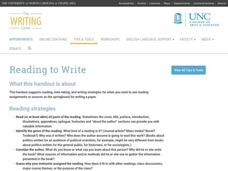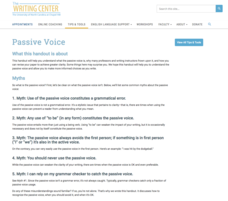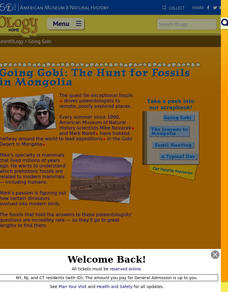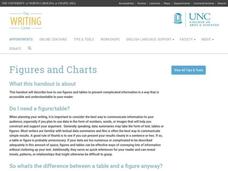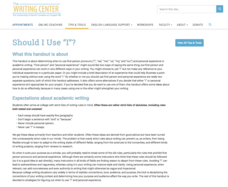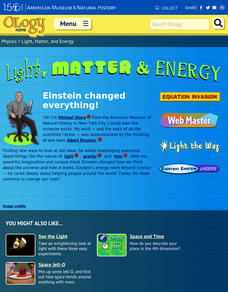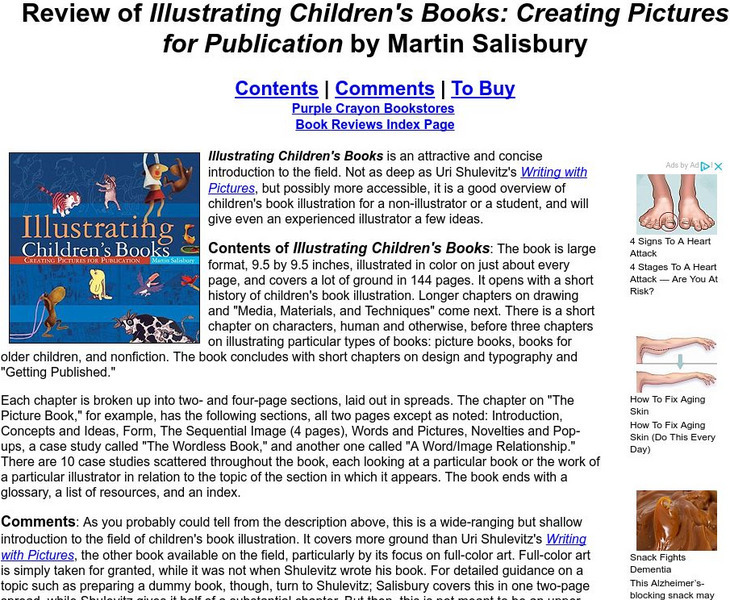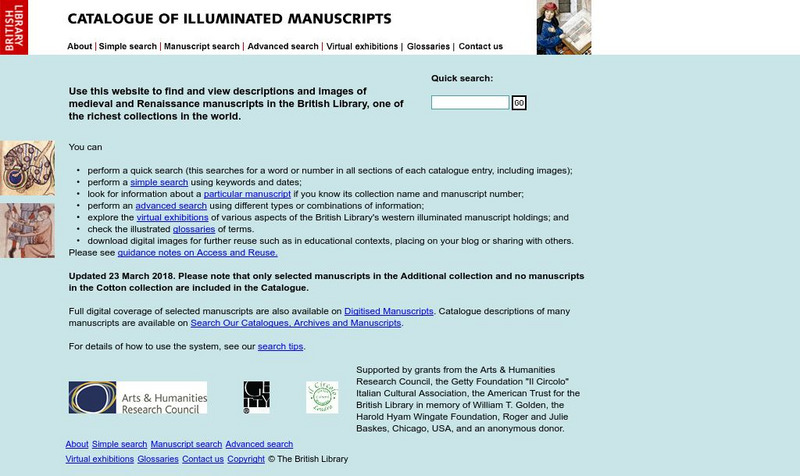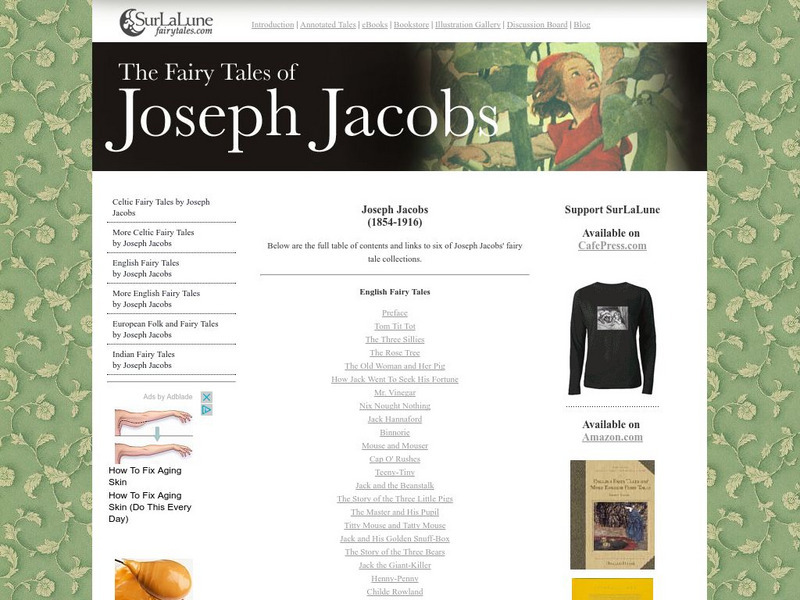University of North Carolina
Reading to Write
Silly journal and essay prompts may be fun to write, but they don't model the kind of writing needed for college papers and standardized tests. The 15th part in a series of 24 covers the concept of reading to write—during and after...
University of North Carolina
Passive Voice
Why was the road crossed by the chicken? Because the writer forgot to write in active voice. Many myths surround the use of passive voice. Thankfully, an informative handout explains how to recognize passive voice and when it's okay to...
American Museum of Natural History
Going Gobi: The Hunt for Fossils in Mongolia
Take a trip on a fossil hunt. Pupils read about a trip to the Gobi Desert by a group of paleontologists to find fossils. Learners view pictures taken on the trip and determine what the scientists go through in the search for answers to...
American Museum of Natural History
What's the Big Idea About Genetics?
Here's a quick read on genetics. An engaging online resource provides six slides of information about genetics. Learners read about the meaning of genetics to information about DNA. They also learn about the study of genes and the...
University of North Carolina
Figures and Charts
Sometimes words aren't the best way to get information across to the reader. The eighth handout in the 24-part Writing the Paper series describes different type of figures and charts to display complex information in a paper....
American Museum of Natural History
A Whale of a Tale
What's the most interesting fact about a blue whale? Learners read an interview about the similarities between the Titanosaur and the blue whale displays at the American Museum of Natural History. Pupils learn not only about blue whales...
University of North Carolina
Literature Reviews
A literature review goes beyond simply giving a novel a thumbs up or thumbs down. In fact, it may not require an opinion at all. Using a handout on literature reviews, part of a larger series on specific writing assignments, writers...
University of North Carolina
Should I Use “I”?
Despite the formal nature of academic writing, personal pronouns frequently appear in high school and college papers. While your first instinct may be to cross them out, sometimes it's okay to use them, an idea covered in a handout that...
University of North Carolina
Communication Studies
A degree in communications incorporates disciplines such as business, law, and media as well. A writing handout offers prospective communications majors information about what kind of assignments to expect in a typical course....
American Museum of Natural History
Going, Going...Gone?
Young environmentalists consider how scientists are attempting to save endangered species. They read about what causes extinction and steps to take to minimize the threats.
American Museum of Natural History
Planetary Mysteries
Get to know our little part of the vast universe. Learners read about the common and not-so-common facts about each of the planets in the solar system. The interactive lesson includes a large amount of information as well as a quiz to...
American Museum of Natural History
Light, Matter and Energy
Let Einstein's work shine the way. Pupils read about Einstein's iconic equation, E=mc^2, using a remote learning resource and see how ideas from other scientists such as Kepner, Curie, Galilei, and Newton led to its discovery. They...
University of North Carolina
Audience
Challenging pupils' perspectives by having them walk in the shoes of the reader. An informative resource discusses how to identify an audience and anticipate their needs before writing an upcoming argumentative essay.
University of North Carolina
Summary: Using it Wisely
Sometimes summarizing keeps a writer from going deeper into their analysis—don't fall into that trap. Learn the difference between summarizing and analyzing using an insightful resource. Focusing on introductions, the lesson shares...
University of North Carolina
Literature (Fiction)
An informative installment of the Writing for Specific Fields series helps readers learn how to interpret and write about fiction. The website details nine easy steps for writing a literary analysis—a useful method for all readers!
Harold D. Underdown
Review: Illustrating Children's Books: Creating Pictures
A book review of "Illustrating Children's Books: Creating Pictures for Publication," including critical contents and comments. Also provides information about who would benefit from reading this book review. A good resource for those...
Penguin Publishing
Penguin Random House: Alice's Adventures in Wonderland: Reading Guide
Learn the background of both the book and the author, Alice's Adventures In Wonderland by Lewis Carroll; then click on the Readers Guide link to use the detailed study questions to spark discussion.
British Library
British Library: Illuminated Manuscripts
A collection of illuminated manuscripts from the 8th to 15th centuries from the British Library. Access the entire collection of 3,000 and read the individual information about each one. A truly beautiful display.
Other
Celtic Fairy Tales by Joseph Jacobs, Etext
Read these fairy tales at this student-friendly site. You can adjust the display to fit your own learning needs. See the actual cover and illustrations, and read the text in whatever size and font family you find most comfortable.
Other
Sur La Lune Fairy Tales: Indian Fairy Tales
30 classic fairy tales from India, as collected and published by Joseph Jacobs in 1912. The writing style is formal but readable and each tale is accompanied by Jacobs' original notes. Examples of tales included: The Gold-Giving Serpent;...
Other
China Radio International
Read program transcripts, view illustrations, and listen to CRI programs in English or Chinese. Station focuses mainly on news but also includes music and special areas for learning Chinese and/or English. Great site for its promotion of...
US Environmental Protection Agency
Epa: Exploring Estuaries
Find click-through tours of estuaries in New York and in Louisiana that provide sustained reading on the science of river deltas. Text is supported by illustrations and a glossary of special terms.
